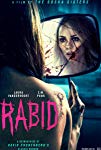Eye For Film >> Movies >> Rabid (2019) Film Review
Rabid
Reviewed by: Jennie Kermode

Remaking an iconic film is always a difficult proposition. Whatever you do, someone's going to be unhappy, and even if it's widely agreed that you've done a good job, you'll only get limited credit for your work. For this reason, some filmmakers refuse to have anything to do with it - but where there is a fresh artistic angle to explore, the stakes change. The Soska sisters' Rabid is less a remake and more of a reconstruction of the story in David Cronenberg's original Rabid, approaching it with different priorities.
Groundbreaking as it was, Cronenberg's film had a plot that mirrored this, the traffic accident that precipitates the action (and foreshadows one of the director's own experiments with somebody else's material, Crash) coming out of nowhere. Here, we get the sense that Rose has been crashing all her life. Played this time around by Laura Vandervoort, she's no longer a model but a fashion designer, an early hint that she will have more agency - but just as the Soska sisters acknowledge the advances that women have made, they introduce us to her as a bruised and uncertain young woman in a mercenary industry where ego is essential to survival. Because we get to know her before the crash, we understand it as something with more than superficial consequences. Rose's facial disfigurement doesn't just rob her of her beauty, it fractures her sense of identity.
The solution to this is a trip to a private clinic working with experimental skin grafts. Rose isn't rich - that myth about the fashion industry is knocked firmly on the head - but she is assured that, because she is such a perfect subject, all the costs will be met for in return for her ongoing availability for follow-up study. When after the procedure, her doctor takes her aside for a word about side effects, some viewers will experience flashbacks to Meryl Streep in Death Becomes Her: "Now a warning?!" But this film is nothing if not self-aware. It's peppered with references to Cronenberg's own work and much more besides. Indeed, it opens with a conversation about the dubious value of originality in art. Self-consciousness is an important aspect of the subject under dissection. Like Gene Tierney's Laura or Clint Eastwood's Man With No Name, Rose has the qualities of an archetypal, folkloric figure, enduring the same events over and over again in different places, in different forms.
Whilst there is nothing here that awes quite like Cronenberg's metro panic scene, with what we see of events playing out on a smaller scale to suit a still-tight budget and tighter on-set health and safety regulations, the new Rabid still delivers its share of shocks, this time in an atmosphere charged by reflections on the #MeToo movement and the way that violence functions as an everyday factor in many women's lives. It's lit in a style that plays with the clichés of fashion studio shoots, the huge empty apartment in which Rose stays with her foster sister Chelsea (Hanneke Talbot) taking on the qualities of a stage. Like the slick medical packaging around the 'protein blend' that our heroine is given to quench strange appetites, it has a distancing effect. In fashion, says Rose, you can be anything you want to be, but in accepting a new version of her old face she puts herself in a position where other identities are grafted onto her. Making one small concession after another, she gradually cedes her humanity, the physical changes that follow coming to seem entirely logical.
Lingering on the sidelines, Chelsea is a witness unable to change events, with all the emotional baggage that brings. Moving closer as the narrative evolves is fashion photographer Brad (Benjamin Hollingsworth), whose persistent interest in Rose disquiets her despite her initial attraction to him, as if concession to that would inevitably entail a loss of power. Meanwhile, the shapes and coded guises of the fashion world move in and out of focus, abstraction passing comment on itself. Though some viewers seems to have missed it entirely, there's a lot of humour here. It's necessary for the film to retain its balance and remain engaging.
It's existential horror that really makes Rabid work and if this version has one major flaw it's that it focuses too much on the physical towards the end, with aspects of the final sequence resembling certain video games and consequently losing their impact. For the most part, however, this is an impressive film, building on the original but speaking for itself. At a time when social norms are undergoing rapid shifts, it nevertheless succeeds in establishing a sense of otherness, in finding the edge.
Reviewed on: 28 Aug 2019
















